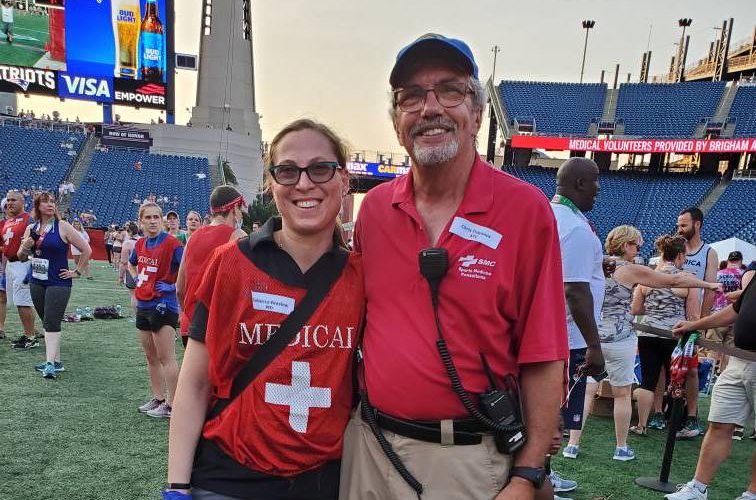
An Interview with Stepping Strong Award Recipient and Sports Injury Expert Rebecca Breslow
Millions of people in the United States participate in long-distance road races each year. While some seem to dance across the finish line, others experience medical issues during or after a race. What factors impact these medical encounters and how can we reduce injuries from occurring? Donna Woonteiler recently spoke with Rebecca Breslow, MD, about a new Stepping Strong Center grant that will help address these and other questions.
DW: Congratulations on receiving a $25K grant from the Stepping Strong Center! I read that you are a life-long runner who competed on the Masters road racing circuit. Tell us about your passion for the sport.
RB: I’ve been running for 33 years. Over the years I ran competitively, owned a coaching business, volunteered in the medical tent at the Boston Marathon, and cared for runners of all abilities. I’ve also had my share of running injuries and had to learn how to “rescue myself” along the way. Through it all I’ve gained valuable insights about discipline, problem-solving, setting goals, consistency, and maintaining a flexible mindset, to name a few.
DW: As you know, the Stepping Strong Center was established to improve outcomes of trauma survivors in the aftermath of the 2013 Boston Marathon bombings. Tell us a about what goes on in the medical tent. What kinds of injuries do you see and how do you manage onsite medical encounters?
RB: Let me start by saying that the infrastructure for medical operations in Boston is a masterpiece. It is a massive effort run by my colleague, Chris Troyanos, who brilliantly oversees the medical tents and hundreds of volunteers. Runner ailments vary, but we see runners with dehydration, heat illness, cardiac arrest, sprained ankles, and other orthopedic injuries.
Lessons learned from the unique challenges that arise each year continually improve care. For example, treating the many runners with heat illness in the 2012 Boston Marathon taught the medical team how to better handle a mass casualty situation. This is why medical volunteers in 2013 knew exactly what to do and leapt into action without hesitation at the finish line.
DW: It was truly a remarkable outcome. But even with that exceptional infrastructure on race day, how do you help runners prevent injuries?
RB: Through the years I’ve developed a common-sense injury prevention toolkit that focuses on self-care, strength training, and listening to one’s body. But the truth is, we need more scientific data on reducing medical encounters in distance running. My hope is to pursue meaningful research to advance this work.
“We need more scientific data on reducing medical encounters in distance running. My hope is to pursue meaningful research to advance this work.”
DW: What are your research goals?
RB: The goal with the Stepping Strong grant is to understand and systematically document medical encounters that have occurred at the Boston Marathon. For instance, what are the kinds of injuries runners endure? What variables increase the risk of injury? How can we do a better job identifying runners who are at high risk before they run a race? And on race day itself, how do we solve medical encounters in the tent and prevent a drain on the local hospitals and the community? Once we understand these issues we can implement prevention strategies.
DW: Are you partnering with others to realize these goals?
RB: Yes! I am collaborating Dr. Cheri Blauwet, a Brigham physician and member of the board of directors of the Boston Athletic Association, Dr. Eric Goralnick, a Stepping Strong innovator who is an expert in emergency preparedness and traumatic injury prevention, as well as Chris Troyanos and the medical directors of the Boston Marathon, Drs. Pierre d’Hemecourt, Aaron Baggish, and Sophia Dyer.
I’m also partnering with a research group in South Africa that oversees a project called SAFER (Strategies to Reduce Adverse Medical Events for the ExerciseR). SAFER has documented medical encounters at the Two Oceans races for many years. By implementing an in-depth, pre-race medical screening questionnaire and online educational platform, SAFER successfully lowered the rate of all race-day medical problems by 29% and reduced serious medical problems by 64%. This very promising data shows that a prevention program can truly make a difference for runners.
The Stepping Strong grant has enabled us to start generating baseline medical encounter data for the Boston Marathon and work towards implementing the SAFER program at this iconic race. The cancellation of the 2020 marathon, and many other large-scale endurance events this year, was disappointing on many levels. However, we in the endurance medicine community are committed to the safe return of endurance sport events. Initiatives like SAFER will reduce injury and illness risk at the Boston Marathon while setting a precedent for injury prevention programs at road races across the U.S.
Rebecca Breslow, MD, is a primary care sports medicine physician at the Brigham, a USA Track & Field Team Physician for the 2019 World Athletics Championships and the upcoming 2021 Tokyo Olympic Games, a board member at the International Institute for Race Medicine, and the Stepping Strong Marathon Team physician extraordinaire.
